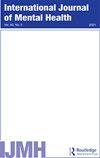“抓住理智的最后一线”:新冠肺炎大流行期间跨性别和非二元囚犯的心理健康挑战
IF 1.7
Q3 PSYCHOLOGY, CLINICAL
引用次数: 0
摘要
摘要背景新冠肺炎对跨部门边缘化身份人群的心理健康产生了特别不利的影响。然而,缺乏关于这种影响的研究证据,产生这种影响的努力因疫情限制而受阻。目的探讨被社会排斥的性别少数群体——跨性别和非二元(TGNB)囚犯——是如何经历和应对疫情压力的。方法2020年4月至10月,通过与英格兰和威尔士15名TGNB囚犯的通信,采用探索性的以人为中心的定性纵向方法收集数据,并使用反射性有机主题分析进行检查。结果疫情及其对支持结构和医疗保健的限制对TGNB囚犯的心理健康和福祉产生了不利影响。TGNB囚犯经历了与交叉监禁和性别少数地位相关的额外压力,包括长期单独监禁和获得性别确认医疗保健的机会减少。监狱疫情制度减少了以问题为中心、以情绪为中心、社会支持和脱离接触应对的环境资源,通过积极分散注意力和与TGNB/LGBTQ社区接触的适应性应对尤其受到影响。结论在疫情期间及以后,需要更多的支持和创新做法,以改善TGNB囚犯获得性别确认护理和TGNB/LGTQ社区的机会,保护他们的心理健康和福祉。本文章由计算机程序翻译,如有差异,请以英文原文为准。
“Gripping onto the last threads of sanity”: transgender and non-binary prisoners’ mental health challenges during the covid-19 pandemic
Abstract Background Covid-19 has had an especially detrimental impact on mental health of people with intersectional marginalized identities. Yet, research evidence on this impact is lacking, with efforts to generate it stymied by pandemic restrictions. Aims To explore how a socially excluded gender minority group—transgender and non-binary (TGNB) prisoners—experienced, and coped with, the pandemic stressors. Methods The data were collected via correspondence with 15 TGNB prisoners in England and Wales in April-October 2020 using an exploratory person-centred qualitative longitudinal approach and examined using reflexive organic thematic analysis. Results The pandemic and its restrictions to support structures and health care detrimentally impacted TGNB prisoners’ mental health and wellbeing. TGNB prisoners experienced added stressors associated with their intersecting incarceration and gender minority positions, including prolonged solitary confinement and reduced access to gender-affirming health care. Environmental resources for problem-focused, emotion-focused, socially supportive and disengagement coping were reduced by the prison pandemic regime, with adaptive coping through positive distraction and engagement with TGNB/LGBTQ community particularly affected. Conclusions During a pandemic and beyond, greater support and innovative practices are needed to improve the TGNB prisoners’ access to gender-affirming care and to TGNB/LGBTQ community, to protect their mental health and wellbeing.
求助全文
通过发布文献求助,成功后即可免费获取论文全文。
去求助
来源期刊

INTERNATIONAL JOURNAL OF MENTAL HEALTH
PSYCHOLOGY, CLINICAL-
CiteScore
3.80
自引率
20.00%
发文量
32
期刊介绍:
The official journal of the World Association for Psychosocial Rehabilitation, the International Journal of Mental Health features in-depth articles on research, clinical practice, and the organization and delivery of mental health services around the world. Covering both developed and developing countries, it provides vital information on important new ideas and trends in community mental health, social psychiatry, psychiatric epidemiology, prevention, treatment, and psychosocial rehabilitation.
 求助内容:
求助内容: 应助结果提醒方式:
应助结果提醒方式:


